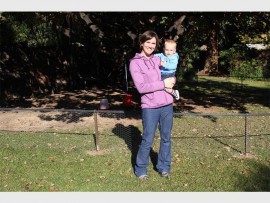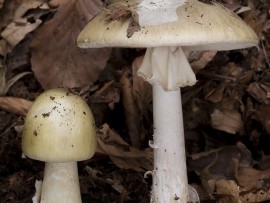14-month-old in hospital after eating poisonous mushroom
DOUGLASDALE – Douglasdale family find toxic mushrooms in their garden.

What started out as a happy day celebrating their son’s first birthday on 6 May, almost ended in tragedy for a Douglasdale family.
The family, that was enjoying a day out with their one-year-old in his newly-built sandpit, ended up rushing the toddler to Fourways Life Hospital after noticing him eat a mushroom. It was later identified as an Amanita phalloides, popularly known as the death cap mushroom.
Jeanne Matthis, the boy’s mom said, “We were outside playing in the sandpit when I noticed that he had something in his mouth.” She and her husband immediately contacted the Tygerberg Poison Centre, which requested images of the mushroom. After identifying the mushroom as poisonous, the Matthis family was advised to immediately take the child to hospital.
Upon arrival at Fourways Life Hospital, the child was given four doses of activated charcoal to absorb the poison, as well as a series of blood tests until he was given the clear a couple of days later.
Matthis said, “We were so fortunate that we saw him eat it… at this age, they eat everything. It is so horrible to think that a mushroom that is so deadly is growing in a Joburg suburb.”
The caps of the mushrooms are 40 to 160mm wide, usually pale green to yellow in colour, with distinctive white gills and a white stem. Symptoms of poisoning generally appear between six to 24 hours after ingesting the death cap and can begin with nausea, vomiting and diarrhoea.
Those who fall ill can improve after a day or two, giving a false impression of recovery. But by that stage, the toxin could have caused serious liver damage which could be fatal.
Death cap poisoning is considered a medical emergency.
The Matthis family has since erected a fence around the tree where the mushroom was found and have also demolished the sandpit.
Carine Marks, director of Tygerberg Poison Centre, explained that the centre only receives an average of one to two calls a year inquiring about the death cap mushroom and this she attributed to lack of knowledge.
“Many other cases go unreported,” she added.
According to Marks, the majority of the calls the centre receives are about innocent non-toxic substances. She explained that the centre assisted the public with poisonings caused by unidentified toxins and offered information on managing poisoning by substances including medicines and drugs, chemicals, pesticides, household products, plants and animals.
The centre’s helpline is a 24-hour service for the public and healthcare workers, and its staff are available to help at Red Cross Children’s Hospital and Tygerberg Hospital.
Details: Send a picture of the ingested substance to toxicology@sun.ac.za or call 0861 555 777; www.sun.ac.za
Read more:
BREAKING: Man critical after pesticide poisoning near Diepsloot
Patient exposed to insecticide moved to Garden City Hospital
High rise in rat poison suicide attempts







